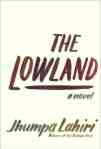The Lowland is the third and most recent novel by acclaimed writer Jhumpa Lahiri.
 This tale of love, loss and family takes place in post-Independence India in a lowland area of Calcutta called Tollygunde. The story revolves around two natives of Tollygunde—Subhash, a conformist, and his younger brother Udayan, a pretentious contrarian. Subhash and Udayan are inseparable as children, but as they enter adulthood their political ideologies and personal goals push them toward divergent paths. Subhash travels to the United States to pursue his education and Udayan joins a Mao-inspired revolutionary political group. Their relationship suffers with the strain of distance; their brotherly bond is soon broken.
This tale of love, loss and family takes place in post-Independence India in a lowland area of Calcutta called Tollygunde. The story revolves around two natives of Tollygunde—Subhash, a conformist, and his younger brother Udayan, a pretentious contrarian. Subhash and Udayan are inseparable as children, but as they enter adulthood their political ideologies and personal goals push them toward divergent paths. Subhash travels to the United States to pursue his education and Udayan joins a Mao-inspired revolutionary political group. Their relationship suffers with the strain of distance; their brotherly bond is soon broken.
At various moments throughout the novel, loneliness is palpable. Subhash feels the weight of loneliness when he first leaves the comforts of home for the United States. Gauri, Udayan’s wife, feels loneliness throughout her life because of her strained family ties and the subservient role of women in her community. And Bela, Udayan’s daughter, feels the loneliness of not belonging fully to the Indian society in which she was born or the American society or culture in which she grows up. Resentment, frustration, guilt and pain are neatly woven into Lahiri’s tale of loneliness as well. These families face challenges, both internal and external, and some of these challenges bring them closer together and some of them stretch them farther apart.
 In my opinion, The Lowland brilliantly yanks back the curtain on one family and places their dysfunction on full display. This novel has its rocky moments of sadness and despair but there are harmonious moments of joy and fulfillment. Overall, Lahiri dissects this family in such a way as to make me love and hate them, sometimes on a single page. Lahiri has created a masterful work; I highly recommend this novel to anyone interested in reading a beautiful piece of fiction.
In my opinion, The Lowland brilliantly yanks back the curtain on one family and places their dysfunction on full display. This novel has its rocky moments of sadness and despair but there are harmonious moments of joy and fulfillment. Overall, Lahiri dissects this family in such a way as to make me love and hate them, sometimes on a single page. Lahiri has created a masterful work; I highly recommend this novel to anyone interested in reading a beautiful piece of fiction.


